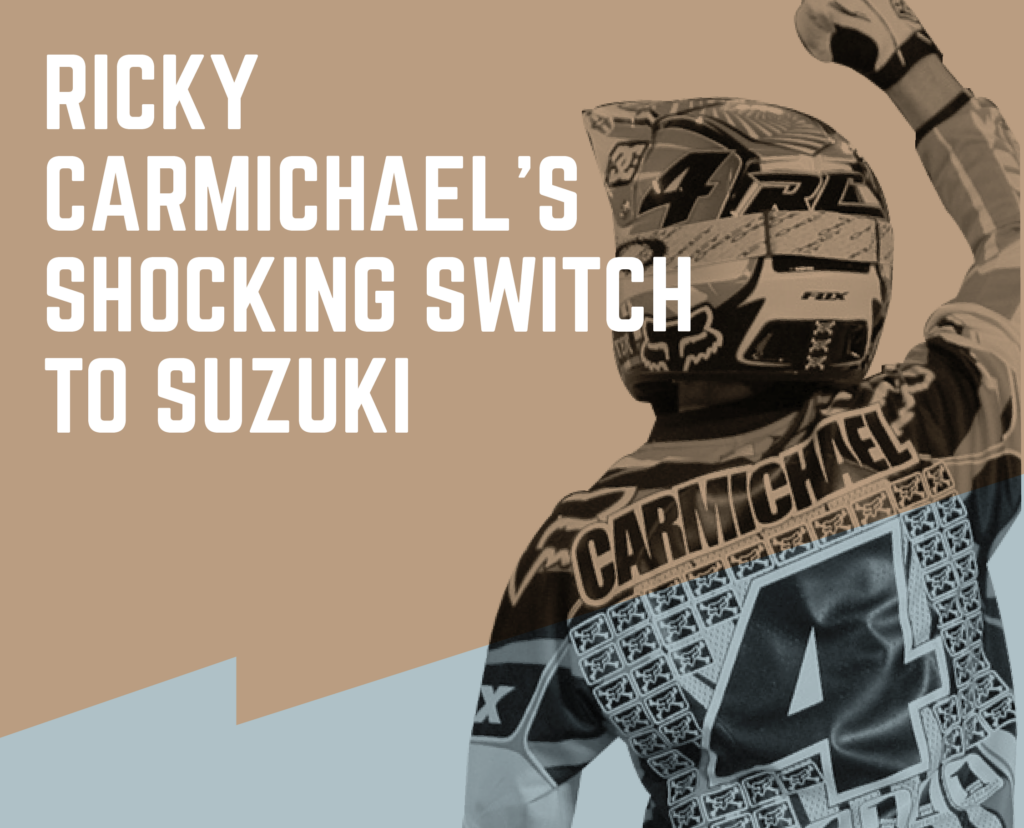
Part 10: Final negotiations: “It was just a f—ing business deal”
Moorman had momentum with Suzuki and he flew to California to meet with Mel Harris and American Suzuki’s general counsel. They laid out the objectives and goals and agreed upon all the pertinent terms. “Mel was impressive in that he trusted me from a business standpoint and believed Ricky was driven to win more championships,” Moorman says.
Carmichael officially now had two offers to consider and he remembers getting pressure to make a decision or risk losing both. In our fourth conversation on this topic, he revealed unshared thoughts about what was going on in his head then. He calculated how many races he had to win on a Honda to equal Suzuki’s guaranteed compensation. Suzuki also had no injury clause in the contract, which meant he would get paid even if he missed races.
“I would’ve won it back on bonuses,” he says. “I would’ve made more money at Honda had I continued on the trajectory I was on with the same amount of race wins.”
It’s true, but not by much. Doing the hypothetical arithmetic, if he’d stayed on a Honda and finished exactly how he did while riding a Suzuki in 2005 and 2006, he would have made almost $500,000 more at Honda given the terms offered.
What if RC Rode a Honda in 2005/2006?
“You don’t want to race for money but you also don’t want to do a f—ing bad deal,” he says, laughing. “You can’t be stupid. You can’t take two and half million less dollars. I mean, listen, at some point you have to draw the line and make the best decision for you financially.”
But Carmichael also had confidence in Suzuki. He knew their RM250 two stroke was a good bike, comparable to the Yamaha YZ250.
You don’t want to race for money but you also don’t want to do a f—ing bad deal
Ricky Carmichael
Despite Suzuki’s base salary offer being more than double Honda’s, Carmichael still wanted to make something work with Honda. After doing all the math, he settled on a number that would make him happy: $300,000. If Honda would agree to raise the base salary offer from $2,300,000 to $2,600,000, he’d sign the contract and stay with Honda for 2005 and beyond. Honda had first right of refusal and they wanted to see this Suzuki offer.
In an e-mail dated March 17, 2004, Jeannie Carmichael told Blank that Moorman was in the process of “finalizing some paperwork” and Blank should expect to see it the following week.

On March 23, Blank wrote to Jeannie in a polite but exasperated-sounding tone. Attached to the message was a Word document titled ‘Honda First Rt. of Refusal Memo’. Blank pleaded, “Please help me with this if you can. This is not an offer. It’s a letter from Ricky’s agent. I could write a letter like this. I need a bona fide offer on company letterhead, un-redacted with a signature on it. Not an agent’s letter. If I take this to the president’s office, he’ll throw me out.”
Instead of sending over an official contractual agreement, Moorman had typed up his own document containing the Suzuki contract details Honda wanted.
When asked if this was a strategy or stall tactic, Moorman said via e-mail, “We provided Honda the necessary terms of the Suzuki offer. My sense is that Mr. Blank always felt I was bluffing and that we would never find a motorcycle manufacturer to agree to the guaranteed compensation and sponsorship freedom we proposed. At the end of the day, I do not believe Mr. Blank was a fan of athlete’s having agents and he wanted to control the negotiating process by dealing directly with athletes and their families.”
FAST TRIVIA
How many main events did Chad Reed win in 2004?
Two days later, Thursday March 25, Blank wrote to Jeannie again. He said he had spoken via phone with Moorman and was given 48 hours to respond. Blank told Jeannie he needed more time because of staffing logistics. He didn’t have the necessary people with him to make this decision. “I’m now waiting on David’s callback after he discusses my dilemma with Ricky,” Blank wrote. “It doesn’t sound too positive to me.”
Carmichael told Moorman to tell Blank that he wanted this finished for good; he planned to start riding again on exactly April 1. He believes his memorable phone call under the oak tree–where Blank said Honda’s offer was final–happened on March 25.
He wishes he could recall the emotion that his friend and mechanic, Mike Gosselaar saw during that moment in the phone all, but he doesn’t. “At that point, straight up, it was just a f—ing business deal,” Carmichael says. “I wasn’t disappointed in [Ray Blank’s] tone.”
Still, he was confident that Honda would find the additional $300,000. When they didn’t, he knew he could make a decision and move on. “I hate gray area. I hate being in limbo no matter what it is in life.”
At that point, straight up, it was just a f—ing business deal
Ricky Carmichael
Chuck Miller acknowledges that, while it came down to $300,000 for Carmichael, it was about more than that for Honda, that they were already overextended. “Ray really wanted Ricky,” Miller says. “He loved the success. But he was already way out on a limb with what we were going to offer up. If it’s only $300,000, that doesn’t sound like much right now, but it was probably more like $800,000 to $1,000,000 over what he was supposed to be spending in some other area of the business.”
Like Suzuki, Honda also underwent a 2004 leadership reorganization. On March 1, they announced the appointment of Koichi Kondo from COO to CEO, effective April 1. Koichi Amemiya was CEO during Carmichael’s first Honda contract negotiation.
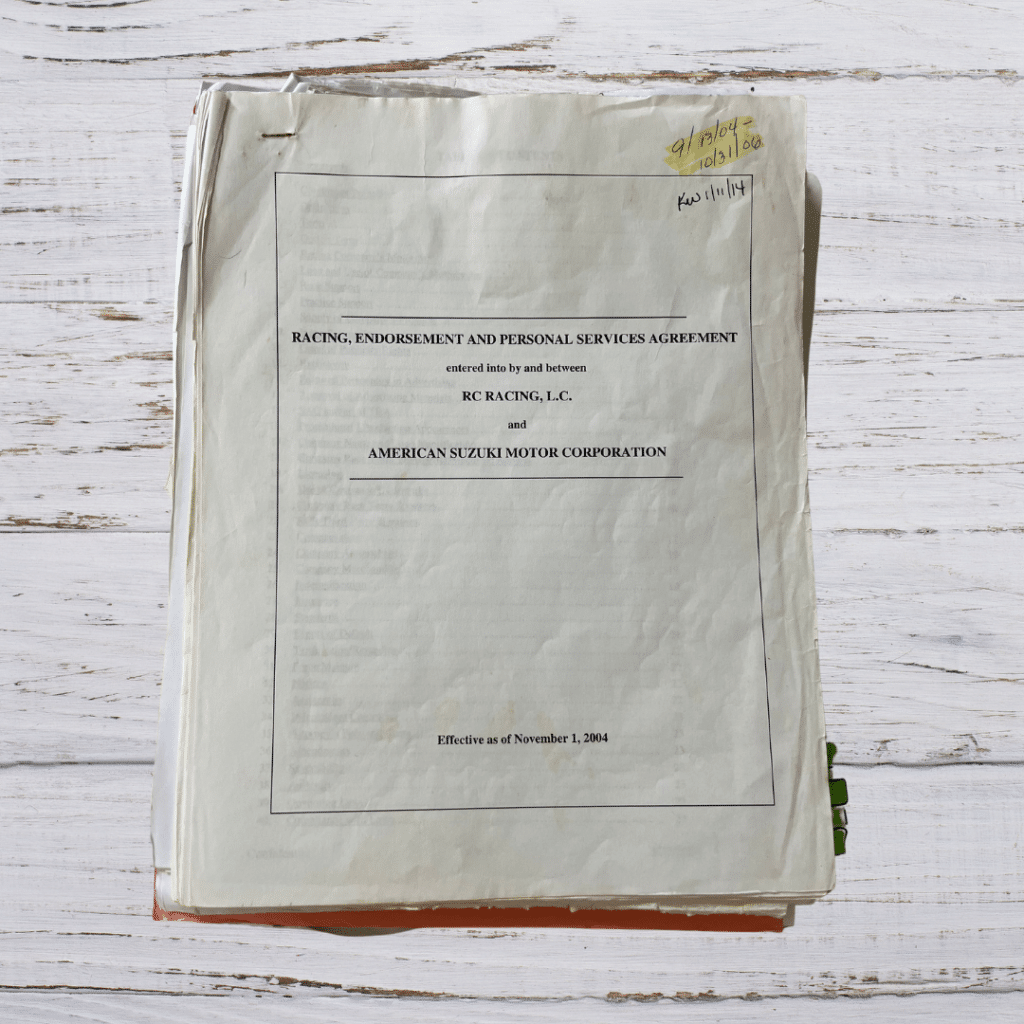
In the 2005 Racer X article, Blank didn’t discuss numerical details, but he did mention the unique payment structure offered by Suzuki. “Honda chose not to comply with this request,” he said. He explained the reasons behind the bonus-heavy industry standard, then laid out the reasons for the decision: Honda simply did not prioritize athletes over company principles and ethics.
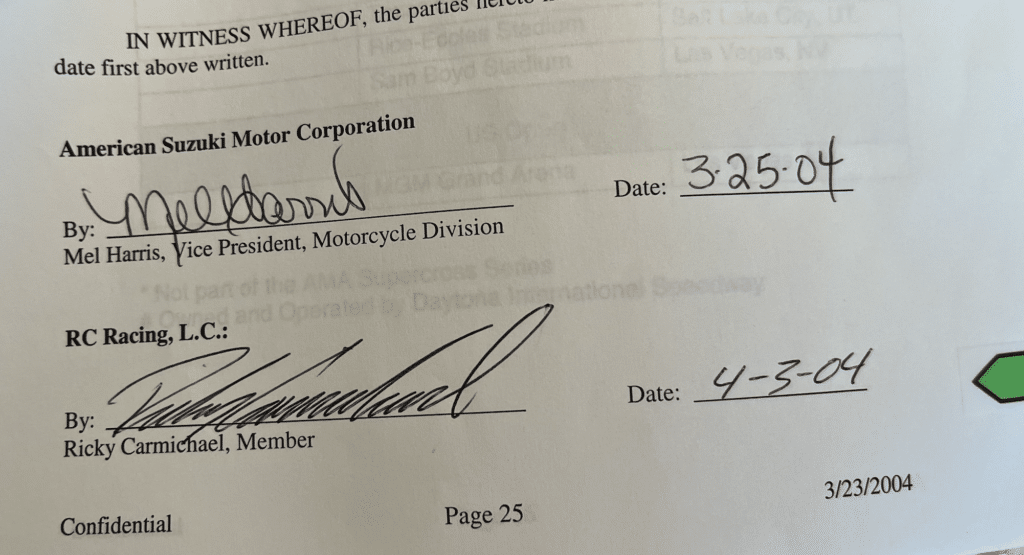
“If we made adjustments like this for Ricky,” he said to Eric Johnson, “then it would only be fair to provide the same scenario for others, and we would not do that: not even after the first-ever perfect season; not even to keep the winningest champion of all time; not even for Ricky Carmichael… We believe this ethic is a big part of our success. It is our way of life. And if we lose a Ricky Carmichael or even a Valentino Rossi, over our principles, so be it.”
A few paragraphs later, Blank also confirmed he was eventually given a copy of the Suzuki contract and a deadline and that he made a difficult phone call to Ricky, “asking him one last time to reconsider the situation.”
After the phone call with Blank, Carmichael called Moorman. “Button up the Suzuki offer and let’s go to hard copy,” he told his agent. Mel Harris’s signature on the official Racing, Endorsement and Personal Services Agreement between RC Racing, L.C. and American Suzuki Motor Corp. is dated March 25, 2004.
BENCH RACING
Would Ricky Carmichael have won the 2004 AMA Supercross Championship if he raced it?
Carmichael kept the cover letter Moorman sent along with one of the three copies of the Suzuki contract, which were waiting for him on April 3 in a suite at the Pontiac Silverdome in Michigan. “I know this process has been difficult for you,” Moorman wrote. “You have handled it with dignity and I am very proud of you. Congratulations on establishing a new standard in the industry. You deserve all the benefits!”
With Roger De Coster standing next to him, Carmichael officially signed a contract to ride for American Suzuki, a company that had only won four premier class AMA Supercross and Motocross championships in his lifetime. He was leaving a company that won 27 championships in that same span, four of them being his own.
Carmichael Starts a Wildfire
JH Leale sat on a runway-bound airplane when he got a phone call just as he was about to power down his cell phone. “I did the deal with Suzuki,” Carmichael said.
Leale knew about the negotiations but was still shocked. Shocked that Carmichael did it, shocked that Honda didn’t do it, and apprehensive about the eventual outcome once starting gates dropped in 2005. He worked at Fox Racing in 1997 and, as the gear sponsor representative, saw what McGrath went through. He asked Ricky, “Are you good with this?”
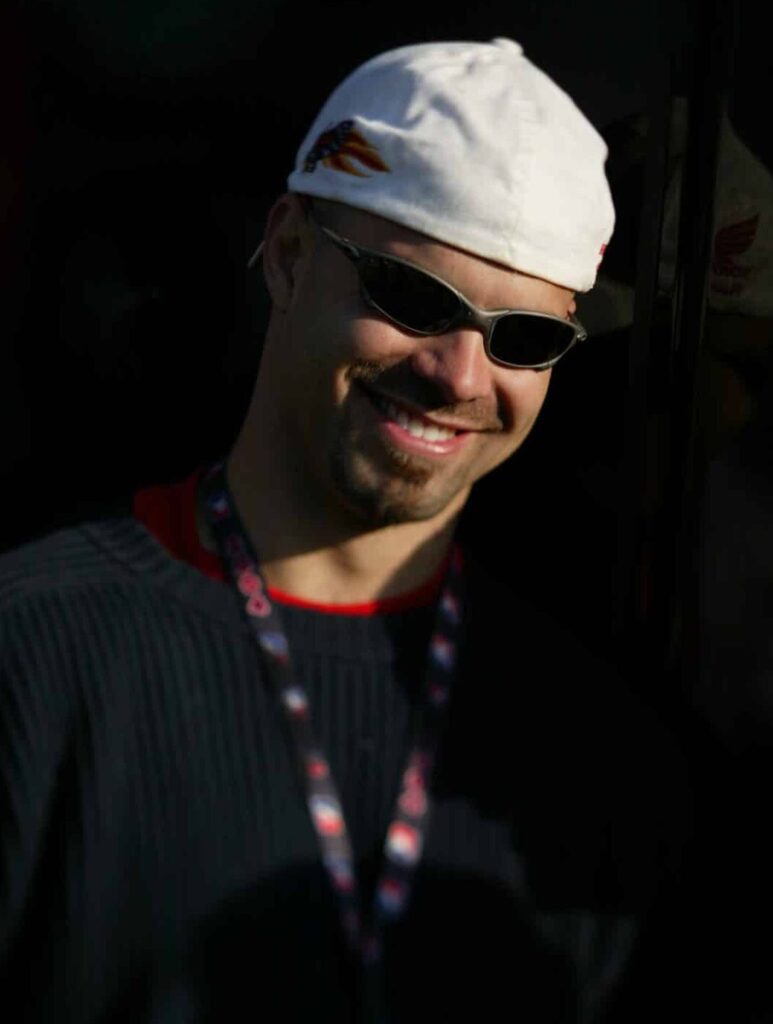
“Yeah, I’m good,” he replied. “I’m going to go win on that thing.” Leale could feel the confidence in Carmichael’s voice but he couldn’t ask any more questions; the plane was taking off.
By the time he landed, the news was everywhere.
Harrison vividly remembers standing in an elevator with De Coster at the Silverdome, about 15 minutes after the signing, and someone congratulated them. Harrison was baffled that people not related to the team were already discussing the news.
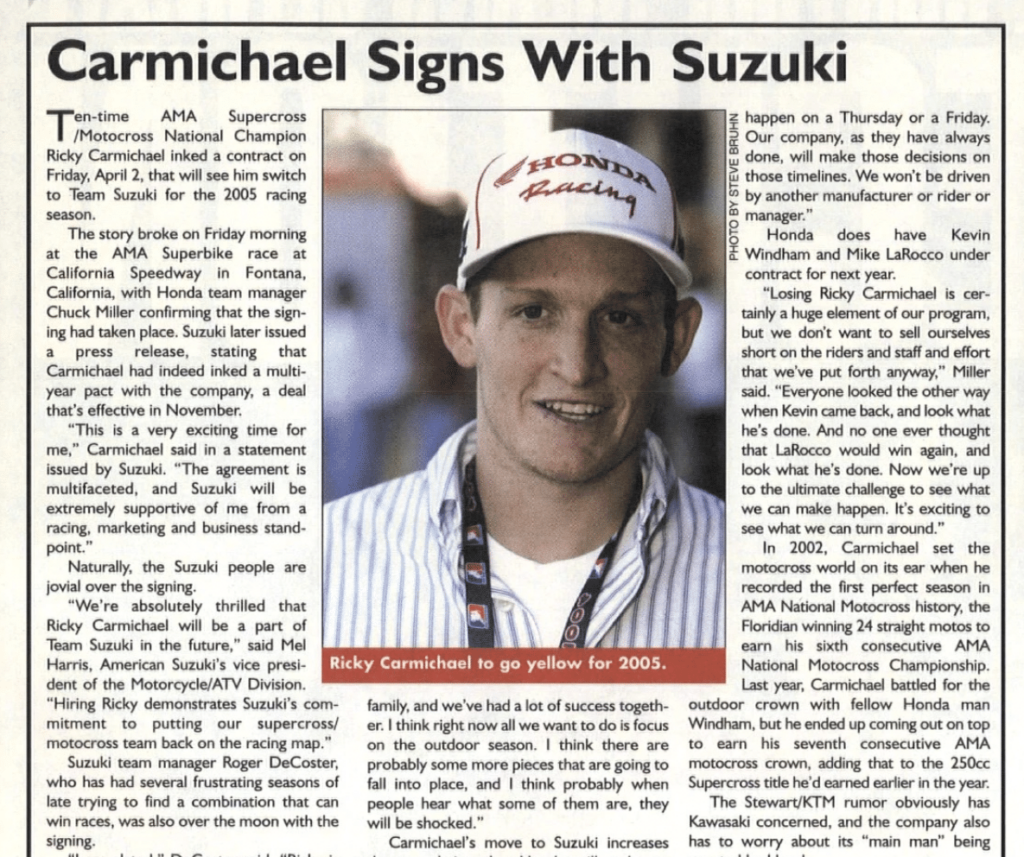
Chuck Miller went to California Speedway in Fontana, California for rounds two and three of the AMA Superbike Championship. According to a report written by Paul Carruthers of Cycle News, the story broke Friday morning in the paddock, which is curious because the date next to Carmichael’s name on the contract was April 3, 2004, a Saturday and the cover memo even stated “VIA FEDEX – SATURDAY DELIVERY”. The news may have broken in California before Carmichael even signed on April 3.
Either way, Miller confirmed to Cycle News that the signing had taken place. He declined to make an official comment but said, “Right now all we want to do is focus on the outdoor season.”
Carruthers wrote, “Carmichael’s move to Suzuki increases the speculation that Honda will make an offer to Chad Reed… Honda would also be a natural fit for James Stewart, but the word at California Speedway was that the phenom is on the verge of signing a deal with the Red Bull KTM Team.” (A KTM employee I spoke to said discussions did happen back in 2004 but ‘on the verge’ is quite a reach).
Our first choice was to retain Ricky Carmichael and keep him on a red bike, but that looks like that’s not going to happen now.
Chuck Miller
When Carruthers asked about Reed and Stewart, Miller responded with a long and passionate-sounding message that echoed Honda’s ethos: “Those opportunities [Reed and Stewart] were available before this as well,” Miller said. “We’ve looked at all of those options, and some things are very pro and some things are a bit con. We didn’t even want to ever go down that road because always our first choice was to retain Ricky Carmichael and keep him on a red bike, but that looks like that’s not going to happen now… We won’t be driven by another manufacturer or rider or manager.”
Blank told Racer X that rumors of Honda stalling on Carmichael to consider Reed or Stewart were “patently untrue”.

Sept. 12, 2004: The End
Late in the morning at Glen Helen Raceway, Carmichael asked Honda’s motocross race team crew to assemble around the CRF450R that he would soon ride in the final two motos of the 2004 AMA Pro Motocross Championship, his last ever on a Honda. These men had helped him win 22 consecutive motos on that four stroke and he wanted to let them all know how much he appreciated what they did to help him succeed. Miller described it as “really neat.”

With #1s on the number plates, the bike itself looked unfamiliar. Carmichael had swapped them with his trademarked #4, not as a show of force, but out of respect to that crew. It was the only time he ran number one in a championship race in his premier class career. “I just felt like I should do that and pay homage to Honda,” he says. “I’m thankful for my tenure there. Just wanted to give them the glory of running number one.”
Carmichael could have easily ducked out of the final race and he had a solid excuse to do so; he’d severely sprained his left ankle that morning. When Kevin Windham crashed on the backside of a jump, Carmichael landed on top of his bike. “My ankle was absolutely exploded,” he says. But even with his first Suzuki test just eight days away, he never considered sitting out at Glen Helen. But he was bummed that his sore ankle dampened his mood a bit.

Riding with a shifting foot he could barely move, Carmichael beat Chad Reed by 39 and 21 seconds to cap off another perfect season. He won all 12 overalls and all 24 motos. Dominate might not even be a strong enough word for what he did. No other rider even sniffed a moto victory.

Carmichael set the single fastest lap time in every moto and led 359 of the 371 laps run. Of the 12 laps he didn’t lead, all were within the first three circulations of each moto. If he was trying to let people know whether or not he could win again, he said it loudly, without saying a thing. Glen Helen also roughly marked one year since he tore his ACL.
FAST TRIVIA
Four different riders led at least one lap in Motocross in 2004: Ricky Carmichael, Chad Reed, Kevin Windham and…?
By the time he hobbled across Glen Helen’s dusty parking lot, the sun had long sunk into the San Gabriel Mountains. For the second time in his career, he found himself, literally, dragging his gear bag to a new home at the close of a championship run. This time he hoisted it into the Suzuki race truck.
Then he took a week off to rest his ankle.
